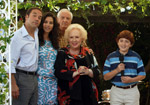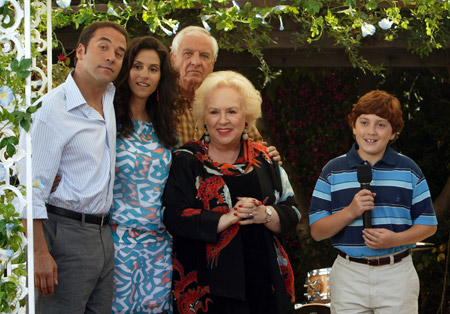Keeping Up With the Steins
 As a movie intended to be a comedy about ethnic idiosyncrasies and, to a lesser extent, religious beliefs, “Steins” presents us with limited shades of Jews—e.g. the ridiculously-wealthy Steins throwing a “Titanic” themed party complete with stage show on the aforementioned ocean liner for their son’s Bar Mitzvah, but Grandpa Irwin (Garry Marshall) can barely afford the shirt on his back. Is there no middle ground to being a Jew? Surely, just as…
As a movie intended to be a comedy about ethnic idiosyncrasies and, to a lesser extent, religious beliefs, “Steins” presents us with limited shades of Jews—e.g. the ridiculously-wealthy Steins throwing a “Titanic” themed party complete with stage show on the aforementioned ocean liner for their son’s Bar Mitzvah, but Grandpa Irwin (Garry Marshall) can barely afford the shirt on his back. Is there no middle ground to being a Jew? Surely, just as…

Photo credit: Michael Yarish.
So a Rabbi, a Nun and a Bishop walk into a bar, and the bartender says, “What is this, some kind of joke?”
Of course I didn’t write that, but I wish the writer, Mark Zakarin, and director, Scott Marshall, had heard it before they set to work on “Keeping Up With the Steins.” They might have learned that such cosmetic approaches to cultural humor go only so far—not far enough for 99 minutes of film. The story, or so we’re forced to believe, is that poor Benjamin Fiedler (Daryl Sabara), the son of affluent entertainment agent Adam Fiedler (Jeremy Piven), is living without, relative to his friend, Zachary Stein (Carter Jenkins) whose ultra-wealthy parents have rented a Cunard ocean liner for his Bar Mitzvah. The problem with this is part skewed perception, part absurd generalization.
As a movie intended to be a comedy about ethnic idiosyncrasies and, to a lesser extent, religious beliefs, “Steins” presents us with limited shades of Jews—e.g. the ridiculously-wealthy Steins throwing a “Titanic” themed party complete with stage show on the aforementioned ocean liner for their son’s Bar Mitzvah, but Grandpa Irwin (Garry Marshall) can barely afford the shirt on his back. Is there no middle ground to being a Jew? Surely, just as there is a middle ground to being a Hindu. I come from such a family. Despite the endless stereotypical diametric opposites of convenience store owners and cardiologists, my family falls squarely in middle-class America. I’m sure it’s possible that, in every culture, some people identify with certain stereotypes. But, really, how funny can it be to see the über-wealthy Arnie Stein in a hideous two-tone tracksuit, trying to hide his age by pretending to have an interest in jogging? How about Adam Goldberg’s cameo as the young and indiscriminately hotheaded tough guy wanna-be? Or the caricaturesque, overbearing grandmother at whom we’re supposed to laugh when she lays on the trademarked guilt trip with, “If I have any opinions I’ll keep it to myself.”
The catalyst for the plot is that every Jewish kid’s parents want to throw the most lavish (read: “gaudy”) party this side of Brentwood—something like those spoiled brats on that MTV show where millionaires throw five, six and even seven-figure parties for their son’s or daughter’s sixteenth birthday. Mr. Fiedler insists, “It’s not what happens at the temple. It’s the party that counts.” There’s even an ephedrine-dosed party planner involved. Gee. Where in Hollywood did they get the idea that the afterparties are more important than the ceremonies?
There are a few subplots, some good and some bad. Adam and his father have been distanced since Irwin walked out on Rose (Doris Roberts), who’s currently Adam and Joanne’s (Jamie Gertz) live-in, token annoying Jewish mother. Nothing more than the requsite “you were never there” monologue takes place to establish the rift between father and son. There’s promise, however, in some scenes with Marshall and Sabara, whose chemistry together is at least as believable as the intercut scenes of Fred Savage and Peter Falk in “The Princess Bride.” A completely underdeveloped, and eventually abandoned, narrative involves Ben’s interest in one of the popular girls at school. Grandpa Fiedler intuits she’s rather shallow, but Ben has to find this out for himself. She only reappears near the end of the film so the director can effect how a just a few hours with Grandpa and one conversation about Judaism with the usually preoccupied Rabbi Schulberg (Richard Benjamin) can turn one insecure, gorpy boy into a confident and secure young man without actually having to etch out real character development. Jami Gertz’ role as Ben’s mother is underused, and Daryl Hannah’s appearance as the pseudo-pantheist Sacred Feather (aka Sandy) only underscores the film’s dour, superficial attitude toward culture.
I was rather hopeful with the direction of Ben’s dialogue with Rabbi Schulman. I thought maybe, finally, we’d get an honest discussion about what Judaism is, and mindful introspection on the significance of the Bar Mitzvah and the reading of the Torah, but not at all. Just when you feel the movie’s going somewhere, it contradicts itself by becoming entirely about the party again. Of course, the party undergoes considerable changes, at the behest of Ben who feels that a star-studded extravaganza at Dodger’s Stadium is missing the point of the whole thing. He’s right, but the film never dives into questioning the very soul of religion and its traditions. Even when the understated, traditional party takes place, I was left wondering where the discussion about meaning went. Then, a surprise guest pops in and the audience as well as the patrons of Ben’s party are all atwitter, buzzing with more interest than during any other part of the film because a celebrity came to sing “Hava Nagila.”
It could have been funny if, after trudging through the sentimentality of traditions, ceremonies and socials, Ben would be seen walking into the house, sullen, wondering why nobody in his Jewish community seems to have elucidated to him the philosophical meaning of Judaism underlying all the ritual. But then, the director treats this movie much in the same way he treats the religion—an endless series of blindly-adhered liturgies, the deeper history and meaning of which is never fully contemplated.
 Keeping Up With The Steins • Dolby® Digital surround sound in select theatres • Aspect Ratio: 1.85:1 • Running Time: 99 minutes • MPAA Rating: PG-13 for some crude language, nudity and brief drug references. • Distributed by Miramax Films.
Keeping Up With The Steins • Dolby® Digital surround sound in select theatres • Aspect Ratio: 1.85:1 • Running Time: 99 minutes • MPAA Rating: PG-13 for some crude language, nudity and brief drug references. • Distributed by Miramax Films.